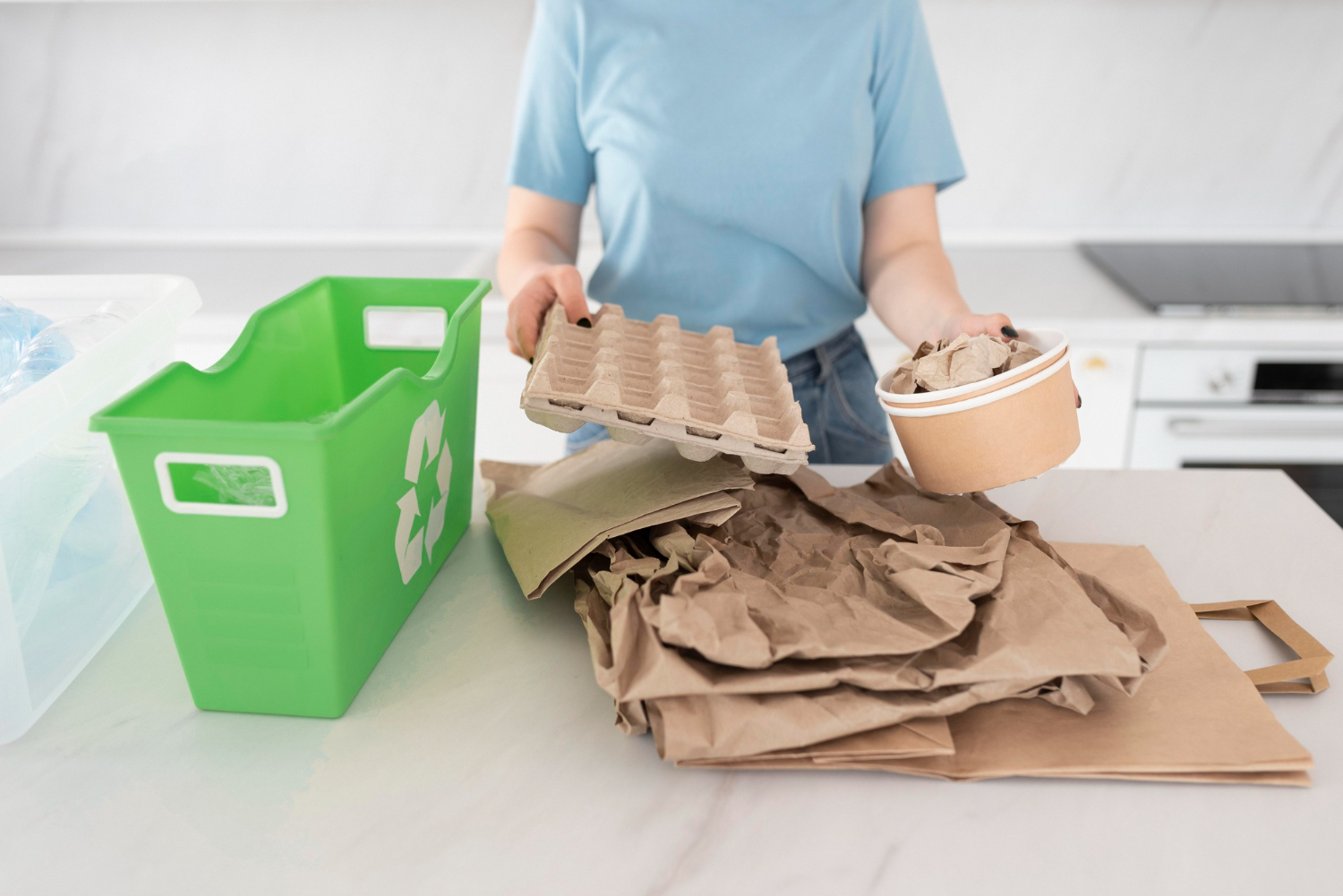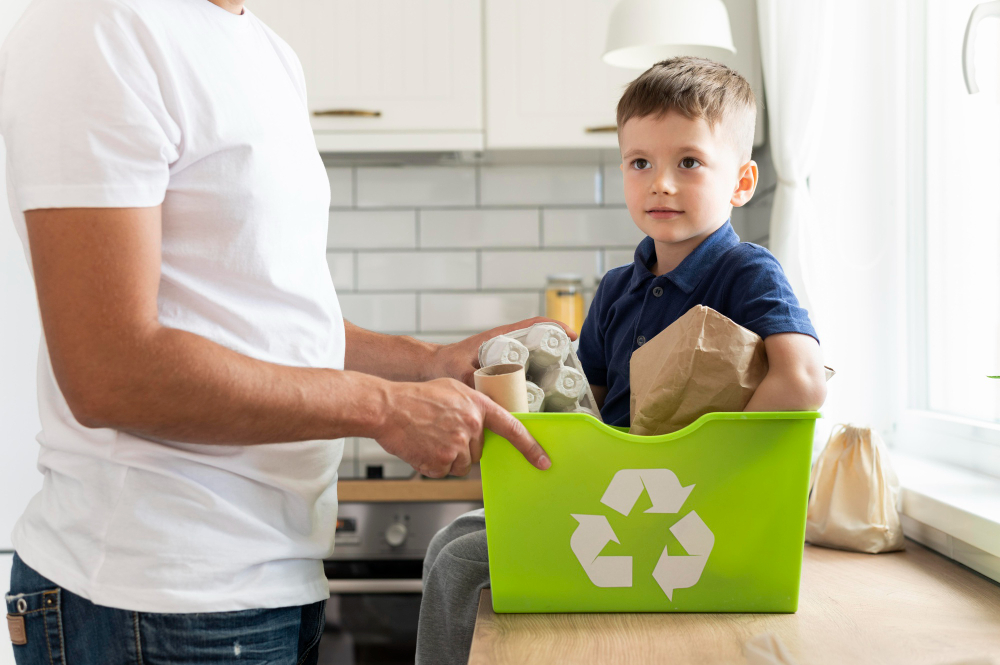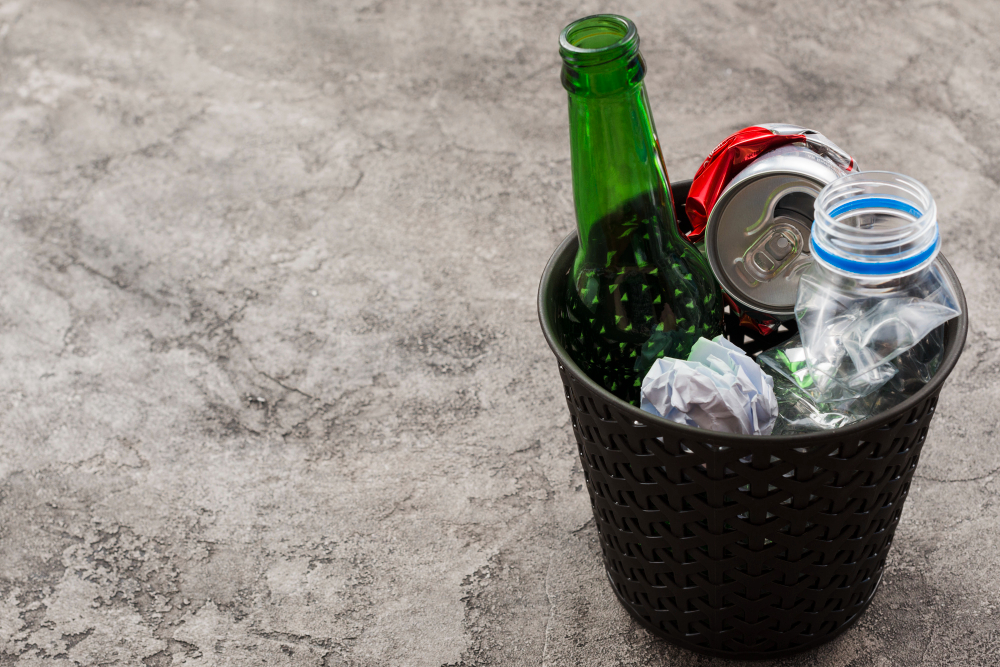Introduction: Why Recycling At Home Matters
Recycling at home is more than just a buzzword; it’s a critical step towards a sustainable future. With growing environmental concerns, setting up an efficient recycling system at home can make a significant impact.
The Environmental Benefits
Recycling helps reduce waste in landfills, conserves natural resources, and reduces greenhouse gas emissions. By recycling at home, you’re contributing to a healthier planet.
Personal Responsibility
Taking responsibility for your waste means less pollution and a more sustainable lifestyle. It’s an empowering way to contribute to the global effort against climate change.
Understanding What Can Be Recycled
Knowing what materials can be recycled is the first step in setting up an efficient system at home.
Common Recyclables
Materials like paper, cardboard, glass, aluminum, and certain plastics are commonly accepted by most recycling programs. Familiarize yourself with your local guidelines.
Non-Recyclable Items
Not everything can be recycled. Items like plastic bags, Styrofoam, and certain contaminated materials need to be disposed of differently. Understanding these distinctions is crucial.
Setting Up Your Home Recycling System
Creating an efficient recycling system at home doesn’t have to be complicated. With some organization and dedication, you can make a big difference.
Designating Recycling Areas
Choose convenient locations for your recycling bins, such as the kitchen, garage, or utility room. Make sure they’re easily accessible to everyone in the household.
Labeling and Sorting
Clearly label your bins for different types of recyclables. This helps in sorting materials correctly and reduces contamination.
Educating Your Household
Getting everyone on board is essential for an efficient recycling system.
Teaching Children
Start by educating your kids about the importance of recycling. Use fun activities and games to make learning engaging.
Involving Adults
Ensure that all adults in the household understand the recycling rules and their importance. Regular reminders can help maintain good habits.
Reducing Waste Before Recycling
Reducing waste is the first step before recycling. By minimizing what you throw away, you can enhance your recycling efforts.
Composting Organic Waste
Composting is a fantastic way to reduce organic waste and create nutrient-rich soil for your garden. Set up a compost bin for food scraps and yard waste.
Reusing and Repurposing
Find creative ways to reuse items. Old jars can become storage containers, and worn-out clothes can be repurposed into cleaning rags.
The Importance of Cleaning Recyclables
Clean recyclables are crucial for the recycling process. Contaminated materials can ruin entire batches of recyclables.
Rinsing Containers
Always rinse out food and beverage containers before recycling. This prevents contamination and pests.
Drying Materials
Ensure that your recyclables are dry before placing them in the bin. Wet materials can cause mold and degrade the quality of paper and cardboard.
Managing E-Waste at Home
Electronic waste requires special handling. Proper disposal of e-waste prevents harmful chemicals from entering the environment.
Recycling Electronics
Look for e-waste recycling programs in your area. Many electronics retailers offer take-back programs for old gadgets.
Donating Usable Electronics
If your old electronics are still functional, consider donating them to schools, charities, or other organizations.
The Role of Community in Home Recycling
Engaging with your community can enhance your home recycling efforts and create a larger impact.
Joining Local Recycling Programs
Participate in local recycling initiatives and programs. This not only supports your community but also provides more resources for effective recycling.
Organizing Community Clean-Up Events
Organize or participate in community clean-up events. These events raise awareness and foster a sense of collective responsibility.
Recycling Special Materials
Some materials require special handling. Knowing how to recycle these items ensures they are properly processed.
Hazardous Waste
Items like batteries, paint, and chemicals need to be taken to designated hazardous waste disposal sites.
Large Items
Large items like furniture and appliances often have specific recycling programs. Check with local authorities for proper disposal methods.
The Benefits of a Home Recycling System
An efficient home recycling system offers numerous benefits beyond environmental impact.
Saving Money
Recycling can save you money by reducing the amount of waste you produce and lowering disposal costs.
Creating a Sustainable Lifestyle
Developing recycling habits leads to a more sustainable lifestyle. It encourages mindful consumption and reduces your ecological footprint.
Key Point 1: Educating your household, reducing waste, and setting up designated recycling areas are fundamental to efficient home recycling.
Implementing a Zero-Waste Kitchen
A zero-waste kitchen is an integral part of a home recycling system. It minimizes waste and maximizes recycling efforts.
Bulk Buying
Purchase items in bulk to reduce packaging waste. Use reusable containers and bags to store bulk goods.
Homemade Products
Make your own cleaning products and snacks. This reduces packaging waste and often results in healthier, cost-effective options.
Composting: The Natural Recycling Process
Composting is nature’s way of recycling organic waste. It’s a simple and effective method to reduce your household waste.
Starting a Compost Pile
Set up a compost bin or pile in your backyard. Include food scraps, yard waste, and other compostable materials.
Maintaining Your Compost
Regularly turn your compost pile to aerate it and speed up the decomposition process. Keep it moist but not too wet.
Recycling in the Bathroom
The bathroom is often overlooked when it comes to recycling. Implementing a system here can significantly reduce your household waste.
Recycling Toiletries
Items like shampoo bottles, toothpaste tubes, and cardboard toilet paper rolls can be recycled. Make sure to clean them first.
Reducing Plastic Waste
Opt for bar soap, bamboo toothbrushes, and refillable containers to minimize plastic waste in the bathroom.
Key Point 2: Implementing a zero-waste kitchen and composting can significantly reduce your household waste and enhance your recycling efforts.
Recycling Textiles and Clothing
Textile waste is a major environmental issue. Properly recycling and repurposing clothing can help mitigate this problem.
Donating Clothes
Donate gently used clothing to charities, shelters, or second-hand stores. This extends the life of the garments and helps those in need.
Repurposing Fabric
Old clothes can be repurposed into cleaning rags, quilts, or craft projects. Get creative and find new uses for old fabric.
The Role of Technology in Home Recycling
Technology can aid in making your home recycling system more efficient and effective.
Recycling Apps
Use apps that provide information on local recycling programs, pick-up schedules, and recycling guidelines.
Smart Bins
Invest in smart recycling bins that can sort and compact waste automatically, making the recycling process easier and more efficient.
Reducing Paper Waste at Home
Paper waste is a significant part of household waste. Reducing and recycling paper can make a big impact.
Going Digital
Opt for digital versions of bills, statements, and subscriptions to reduce paper waste.
Recycling Paper Products
Recycle newspapers, magazines, and office paper. Ensure they are clean and dry before recycling.
Key Point 3: Recycling textiles, leveraging technology, and reducing paper waste are vital steps in creating an efficient home recycling system.
Creating a Recycling Schedule
A recycling schedule can help you stay organized and ensure that recyclable materials are properly disposed of.
Weekly Pick-Up
Check your local recycling pick-up schedule and align your recycling routine with it. This ensures that recyclables are regularly collected.
Monthly Drop-Off
For materials that require special handling, schedule monthly trips to recycling centers or hazardous waste disposal sites.
Involving Kids in Recycling
Teaching kids about recycling from a young age instills lifelong sustainable habits.
Fun Activities
Engage kids with fun recycling activities like crafts made from recyclables or games that teach sorting.
Responsibility
Assign recycling tasks to children. This can include sorting recyclables, rinsing containers, or helping with composting.
The Impact of Reducing Food Waste
Reducing food waste is a crucial aspect of home recycling. It helps conserve resources and reduce landfill waste.
Meal Planning
Plan your meals to avoid overbuying and wasting food. Use leftovers creatively to minimize waste.
Proper Storage
Store food properly to extend its shelf life. Use airtight containers and keep your fridge organized.
Recycling and Mental Health
Engaging in recycling can have positive effects on your mental health.
Sense of Accomplishment
Successfully recycling and reducing waste gives a sense of accomplishment and purpose.
Connection to Nature
Recycling fosters a connection to nature and promotes a sense of stewardship for the environment.
Key Point 4: Creating a recycling schedule, involving kids, and reducing food waste are key to maintaining an efficient home recycling system.
The Role of Local Government in Home Recycling
Local governments play a vital role in supporting home recycling efforts.
Providing Resources
Many local governments provide resources like recycling bins, educational materials, and pick-up services.
Enforcing Regulations
Government regulations on waste management ensure that recyclables are properly handled and processed.
Encouraging Neighbors to Recycle
Building a community around recycling can amplify your efforts.
Neighborhood Programs
Start a neighborhood recycling program or club to share tips, resources, and support.
Peer Influence
Lead by example. When neighbors see your commitment to recycling, they may be inspired to follow suit.
Recycling and Water Conservation
Recycling also intersects with water conservation efforts.
Water-Efficient Appliances
Use water-efficient appliances to reduce water waste. This complements your recycling efforts by conserving resources.
Greywater Systems
Implement greywater systems to recycle water from sinks, showers, and laundry for irrigation purposes.
Key Point 5: Local government support, encouraging community involvement, and integrating water conservation are crucial for a holistic home recycling system.
The Future of Home Recycling
The future of home recycling looks promising with advancements in technology and increased awareness.
Innovations in Recycling Technology
New technologies are emerging that make recycling more efficient and accessible. These innovations can revolutionize home recycling systems.
Advanced Sorting Systems
Advanced sorting systems use AI and robotics to separate recyclables more accurately, reducing contamination and improving recycling rates.
Biodegradable Materials
The development of biodegradable materials can reduce the burden on recycling systems. These materials decompose naturally, minimizing environmental impact.
The Economic Benefits of Recycling At Home
Recycling at home can lead to significant economic benefits for households and communities.
Cost Savings
Recycling can reduce waste disposal costs and sometimes even generate income from selling recyclables. Savings on garbage bags and reduced trash collection fees also add up.
Job Creation
The recycling industry creates jobs in collection, sorting, processing, and manufacturing. By supporting recycling, you’re also contributing to the local economy.
Addressing Common Recycling Myths
There are many misconceptions about recycling that can hinder your efforts. Let’s debunk some common myths.
Myth 1: One Person Can’t Make a Difference
Every individual’s effort counts. Collective small actions can lead to significant environmental benefits.
Myth 2: Recycling Uses More Resources
The recycling process does use energy, but it typically consumes less than producing new materials from raw resources. Recycling is generally more resource-efficient.
Sustainable Shopping to Support Recycling
Your purchasing decisions can impact your recycling efforts. Opt for products that support sustainability and recyclability.
Choosing Recyclable Packaging
Buy products with minimal and recyclable packaging. Avoid single-use plastics and opt for glass, cardboard, or metal containers.
Supporting Eco-Friendly Brands
Support brands that prioritize sustainability and use recycled materials. Your choices can drive demand for environmentally responsible products.
Creating a Home Recycling Center
A dedicated recycling center in your home can streamline the process and keep things organized.
Designating a Space
Choose a convenient spot in your home for your recycling center. It could be a corner of the garage, a utility room, or even a pantry.
Organizing Bins
Use clearly labeled bins for different types of recyclables. Ensure they are easily accessible and maintainable.
Key Point 6: Addressing recycling myths, making sustainable shopping choices, and creating a home recycling center are essential steps for an effective recycling system.
The Impact of Recycling on Wildlife
Recycling at home can have a positive impact on wildlife and natural habitats.
Reducing Habitat Destruction
Recycling reduces the need for raw material extraction, which often leads to habitat destruction. By recycling, you help preserve natural habitats.
Preventing Pollution
Proper waste management prevents litter and pollution, protecting wildlife from harmful substances and preserving ecosystems.
Recycling Household Hazardous Waste
Properly handling household hazardous waste is crucial for environmental and human health.
Identifying Hazardous Materials
Identify items like batteries, paint, chemicals, and electronics that require special disposal methods.
Safe Disposal Practices
Take hazardous waste to designated disposal sites. Many communities offer drop-off days or special collection services for these items.
The Role of Schools in Promoting Recycling
Schools play a critical role in educating the next generation about the importance of recycling.
Recycling Programs in Schools
Encourage schools to implement recycling programs and teach students about sustainable practices.
Student Involvement
Involve students in recycling initiatives and projects. This hands-on experience can instill lifelong recycling habits.
Recycling Yard Waste
Yard waste is a significant part of household waste. Recycling it can benefit your garden and the environment.
Composting Yard Waste
Composting yard waste creates nutrient-rich compost for your garden. It’s an eco-friendly way to manage leaves, grass clippings, and branches.
Mulching
Use a mulching mower to recycle grass clippings directly onto your lawn. Mulching helps retain moisture and provides nutrients to the soil.
Key Point 7: Recycling impacts wildlife positively, managing household hazardous waste responsibly, and promoting recycling in schools are crucial for an efficient home recycling system.
Reducing Plastic Waste at Home
Plastic waste is a major environmental issue. Reducing plastic use and recycling can mitigate this problem.
Avoiding Single-Use Plastics
Avoid single-use plastics like straws, cutlery, and bottles. Opt for reusable alternatives made from stainless steel, glass, or bamboo.
Recycling Plastic Properly
Ensure plastic items are clean and dry before recycling. Check local guidelines for specific plastic recycling rules.
Recycling Metals at Home
Metals like aluminum and steel are highly recyclable and valuable. Recycling them conserves resources and energy.
Recycling Aluminum Cans
Aluminum cans are easy to recycle and can be turned into new cans within weeks. Rinse and crush them to save space in your recycling bin.
Recycling Scrap Metal
Collect scrap metal from old appliances, furniture, and tools. Many recycling centers accept scrap metal and may even pay for it.
The Importance of Proper Sorting
Properly sorting recyclables is crucial for the efficiency of the recycling process.
Reducing Contamination
Contamination can spoil whole batches of recyclables. Ensure that recyclables are clean and sorted correctly to avoid this issue.
Streamlining the Process
Proper sorting makes the recycling process more efficient, saving time and resources for recycling facilities.
Key Point 8: Reducing plastic waste, recycling metals, and proper sorting are key components of a successful home recycling system.
Upcycling: Giving New Life to Old Items
Upcycling transforms old items into something new and useful, reducing waste and sparking creativity.
Creative Upcycling Ideas
Turn old furniture into new pieces, create art from discarded items, or use jars and bottles for storage and decoration.
Benefits of Upcycling
Upcycling reduces waste, saves money, and allows you to personalize your belongings. It’s a fun and creative way to contribute to sustainability.
The Role of Policy in Home Recycling
Government policies can support and enhance home recycling efforts.
Local Recycling Regulations
Familiarize yourself with local recycling regulations. Compliance ensures that recyclables are processed correctly.
Advocacy and Involvement
Get involved in advocating for better recycling policies and infrastructure in your community. Your voice can make a difference.
Encouraging Reuse Over Recycling
Reusing items is even more sustainable than recycling. Find ways to reuse items in your home before considering recycling.
Repurposing Everyday Items
Use glass jars for storage, repurpose old clothes into cleaning rags, and find new uses for boxes and containers.
The Environmental Impact
Reusing items reduces the demand for new products and the resources required to produce them, significantly lowering your environmental footprint.
The Future of Home Recycling Systems
Looking ahead, home recycling systems will continue to evolve with technological advancements and increased awareness.
Smart Home Recycling
Future recycling systems may integrate with smart home technology, providing real-time data and automation to streamline the process.
Sustainable Innovations
Innovations in sustainable materials and recycling technologies will make it easier to reduce waste and recycle efficiently.
Key Point 9: Upcycling, understanding policy, encouraging reuse, and anticipating future advancements are essential for a comprehensive home recycling system.
Building a Recycling Habit
Developing a consistent recycling habit is key to maintaining an efficient system at home.
Consistency is Key
Make recycling a regular part of your routine. Consistency ensures that recyclables are managed properly and waste is minimized.
Celebrating Milestones
Celebrate milestones in your recycling journey. Whether it’s reducing your household waste by half or successfully composting, acknowledge your achievements.
The Role of Composting in Recycling
Composting is a natural way to recycle organic waste and enrich your soil.
Composting Basics
Start with a compost bin or pile and add kitchen scraps, yard waste, and other compostable materials. Turn it regularly to aerate and speed up decomposition.
Benefits of Composting
Composting reduces landfill waste, produces nutrient-rich soil, and lowers your household’s carbon footprint.
Key Point 10: Developing a recycling habit, incorporating composting, and celebrating milestones are crucial for sustaining an efficient home recycling system.
Conclusion: The Impact of Recycling At Home
Recycling at home is a powerful way to contribute to environmental sustainability. By setting up an efficient system, educating your household, and staying committed, you can make a significant difference.
The Ripple Effect
Your efforts can inspire others in your community to start recycling, amplifying the positive impact on the environment.
A Sustainable Future
Together, we can create a sustainable future by making recycling a part of our daily lives. Every small step counts towards a greener, healthier planet.
FAQ’s:
What items can I recycle at home?
Most common recyclables include paper, cardboard, glass, aluminum, and certain plastics. Check local guidelines for specifics.
How do I start composting at home?
Begin with a compost bin or pile, add kitchen scraps and yard waste, and turn it regularly to aerate and speed up decomposition.
Can I recycle electronics at home?
Electronics require special handling. Look for local e-waste recycling programs or retailer take-back initiatives.
What should I do with hazardous waste?
Hazardous waste like batteries, paint, and chemicals should be taken to designated disposal sites. Many communities offer drop-off days.
How can I involve my kids in recycling?
Teach kids about recycling through fun activities and assign them age-appropriate recycling tasks to build lifelong habits.
What are the benefits of reducing food waste?
Reducing food waste conserves resources, lowers your carbon footprint, and saves money on groceries.
Why is it important to clean recyclables?
Clean recyclables reduce contamination, ensuring that materials are properly processed and not rejected.
Can I recycle plastic bags at home?
Most curbside programs do not accept plastic bags. Recycle them at designated drop-off points, often found at grocery stores.
What are smart bins?
Smart bins are advanced recycling bins that sort and compact waste automatically, making recycling more efficient.
How does recycling benefit wildlife?
Recycling reduces habitat destruction and pollution, protecting wildlife and preserving ecosystems.



